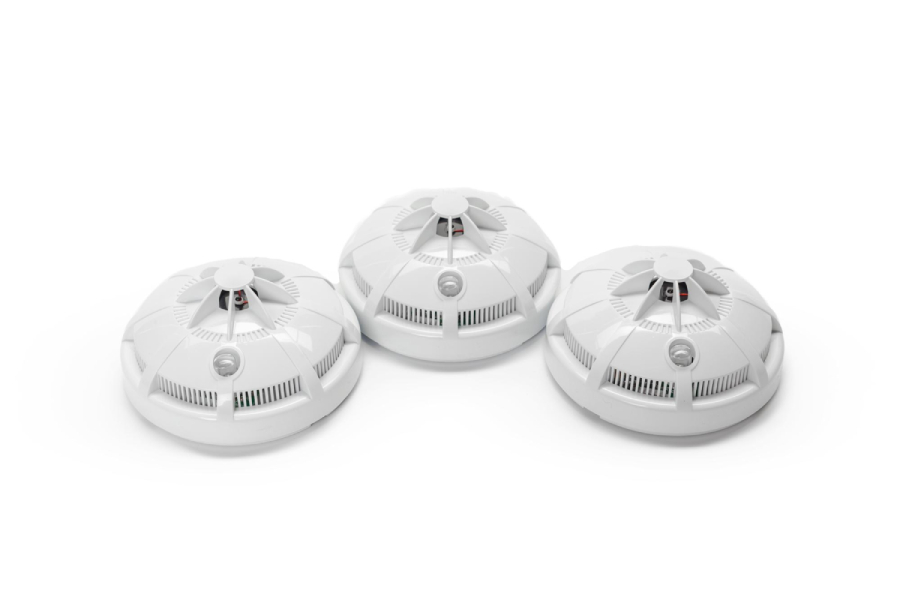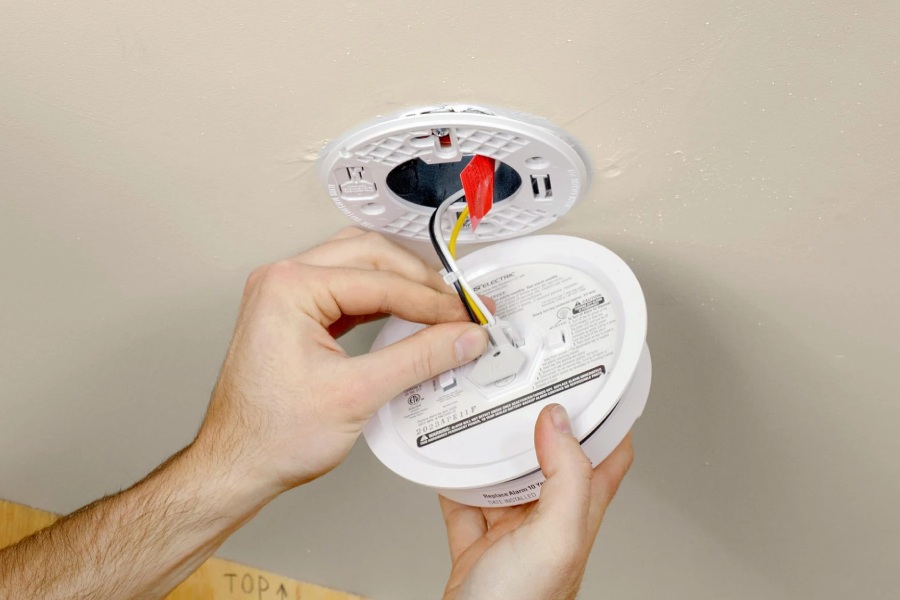In the quest for home safety, two devices stand at the forefront of fire prevention: smoke alarms and smoke detectors. These terms are often used interchangeably, leading to confusion among homeowners and even some professionals. So, what are the differences between smoke alarm vs smoke detector?
Understanding the distinctions between these life-saving devices is crucial for ensuring optimal protection in our living spaces. That’s why we’ll break down the differences between smoke alarms and smoke detectors to help you understand which device is best suited for your needs, whether at home or in a commercial setting.
Dive into the nuances between these two devices to discover how they each contribute to a comprehensive fire safety strategy!
Smoke Alarm vs Smoke Detector
While both devices are designed to alert you to the presence of smoke, they function in distinct ways within a fire protection system. A smoke alarm is a standalone device that detects smoke and emits a loud alarm to alert occupants of danger.
On the other hand, a smoke detector only senses smoke and sends a signal to a central alarm system, which then triggers an alert. Knowing which one to use and where can make a significant difference in your overall safety plan.
So, what is the difference between smoke detectors and smoke alarms regarding their features? Here is a breakdown of the key differences between these two critical safety devices:

Smoke alarm
Smoke alarms are life-saving devices that detect smoke and sound a loud alert to warn occupants of a fire. They consist of a smoke sensor, a loud horn or speaker, and a power source, which can be either batteries or a wired connection with a backup battery.
These alarms are crucial for residential safety, typically installed in bedrooms, living rooms, and near kitchens. Some modern models offer additional features like smartphone connectivity or voice alerts. These enhancements improve their effectiveness in notifying occupants of potential dangers.
Smoke detector
Smoke detectors are distinct from smoke alarms as they are integral components of a comprehensive fire safety system designed for large buildings. They feature a smoke sensor that communicates with a central control panel, which manages the entire alarm system.
Unlike smoke alarms, equipped with built-in sound alerts, smoke detectors depend on external systems such as sirens or flashing lights to notify occupants. These detectors play a critical role in ensuring fire safety across various environments.
Functionality and features
Smoke alarm
As mentioned, smoke alarms detect smoke and emit a loud noise to alert occupants, giving them time to escape or address small fires. Types of smoke alarms include ionization for fast flames, photoelectric for smoldering fires, and dual-sensor for broader coverage.
Furthermore, common features include battery operation for reliability during power outages and interconnectivity so that all alarms sound if one is triggered. Some models also detect carbon monoxide for added safety.
Smoke detector
Smoke detectors monitor for smoke but do not make noise. Instead, they signal a central control panel, which manages alarms, alerts, and other safety measures in large buildings.
There are various types, including ionization, photoelectric, beam, and aspirating detectors, each suited to different environments. Moreover, common features include integration with broader fire alarm systems, remote monitoring capabilities, and sensitivity adjustments to minimize false alarms.
Installation and placement
Smoke alarm
For optimal safety, it’s important to install smoke alarms throughout your home. Place them on every level, inside each bedroom, and just outside sleeping areas while keeping them away from stoves, windows, and air vents to avoid false alarms.
Many smoke alarms are designed for easy installation, with battery-powered models requiring only basic tools like a drill and screwdriver. Hardwired models, however, should be handled by a licensed electrician. Once installed, regular maintenance is key:
- Test each alarm monthly.
- Replace the batteries annually or when they signal low power.
- Ensure the entire unit is replaced every 10 years to ensure continued protection.
Smoke detector
In commercial settings, the installation of smoke detectors is crucial for ensuring safety and compliance with fire codes. These devices should be strategically placed on ceilings or high walls, with their positioning carefully determined based on the building’s size, layout, and unique areas like stairwells and elevator shafts.
We must emphasize that professional installation is essential to guarantee proper integration with control panels and adherence to regulations. Additionally, regular maintenance is necessary, including annual inspections by certified professionals and routine testing of the detectors, to ensure they remain in line with current fire safety standards.

Pros and cons
Smoke alarms are affordable, easy to install, and offer immediate alerts in case of danger. However, they operate independently, which can pose a challenge in larger homes, as coverage may be limited. They are also prone to triggering false alarms from minor smoke.
On the other hand, smoke detectors are part of a more comprehensive system, making them ideal for larger buildings. These devices can be integrated with alarms and remote monitoring systems, providing greater protection and convenience. Despite these benefits, they tend to be more expensive, require professional installation, and rely on a central system and power supply.
Use Cases and Applications
For residential use, smoke alarms must be installed on every level of the home, including inside and outside bedrooms, and kept away from cooking appliances to avoid false alarms. Also, regular maintenance is crucial and includes monthly testing, annual battery replacement, and a full unit replacement every 10 years to ensure continued functionality.
In larger estates, interconnected smoke detectors provide comprehensive coverage by linking multiple alarms. Smart detectors further enhance safety by offering Wi-Fi alerts for real-time notifications.
Smoke detectors play a critical role in commercial buildings, helping to detect early fires, protect property, and ensure compliance with insurance requirements. Tailor-made fire detection systems are also designed for specialized environments such as hospitals and data centers, meeting the unique needs of these high-risk areas.
Choosing the Right Option
When selecting between a smoke alarm and a smoke detector, consider several key factors:
- Building size and layout: For larger buildings or complex layouts, a smoke detector system, which is often connected to a central alarm panel, may be more appropriate as it can offer comprehensive coverage and integration with other safety systems. In smaller homes, standalone smoke alarms, which operate independently, may suffice.
- Budget constraints: Smoke alarms are generally more affordable and suitable for residential use where individual units are needed. Smoke detectors, particularly those part of a larger fire alarm system, can be more expensive due to installation and maintenance costs but provide enhanced monitoring and integration for commercial settings.
- Specific safety needs and regulatory requirements: Assess the building’s specific safety needs. Smoke detectors are often required in commercial properties to meet fire codes and safety regulations, as they can be integrated with broader alarm systems. Residential properties may meet safety standards with smoke alarms, but ensure they comply with local regulations regarding placement and installation.
Recommendations for different scenarios
- Small residential homes: Use standalone smoke alarms installed in each bedroom, outside sleeping areas, and on every floor. These are cost-effective and sufficient for smaller spaces where a simple, independent system provides adequate coverage.
- Large residential properties: Opt for interconnected smoke alarms placed in every bedroom, hallway, and on each floor, including basements and attics. Interconnected alarms enhance safety by ensuring that if one alarm detects smoke, all alarms will sound, offering more comprehensive protection in larger spaces.
- Commercial buildings and complexes: Install a smoke detector system integrated with a central fire alarm panel. Place detectors throughout the building, including in hallways, offices, storage areas, and special spaces like stairwells and elevator shafts. This setup meets regulatory requirements and provides enhanced monitoring and response capabilities in larger, more complex environments.
Conclusion
Smoke alarms and smoke detectors serve distinct yet complementary roles in fire safety. So, what is the difference between smoke alarm vs smoke detector?
Smoke alarms are standalone devices that detect smoke and sound an immediate alert, making them ideal for residential use. In contrast, smoke detectors are part of larger systems designed for commercial properties, detecting smoke and sending signals to a central alarm system for broader notification.
Choosing the right device depends on your building’s size, layout, and safety needs. Smoke alarms offer cost-effective protection for smaller homes, while smoke detectors benefit larger buildings by integrating and covering them.
So, selecting the appropriate device—whether a smoke alarm for immediate alerts or a smoke detector for comprehensive system integration—ensures tailored and effective fire safety for any environment.


